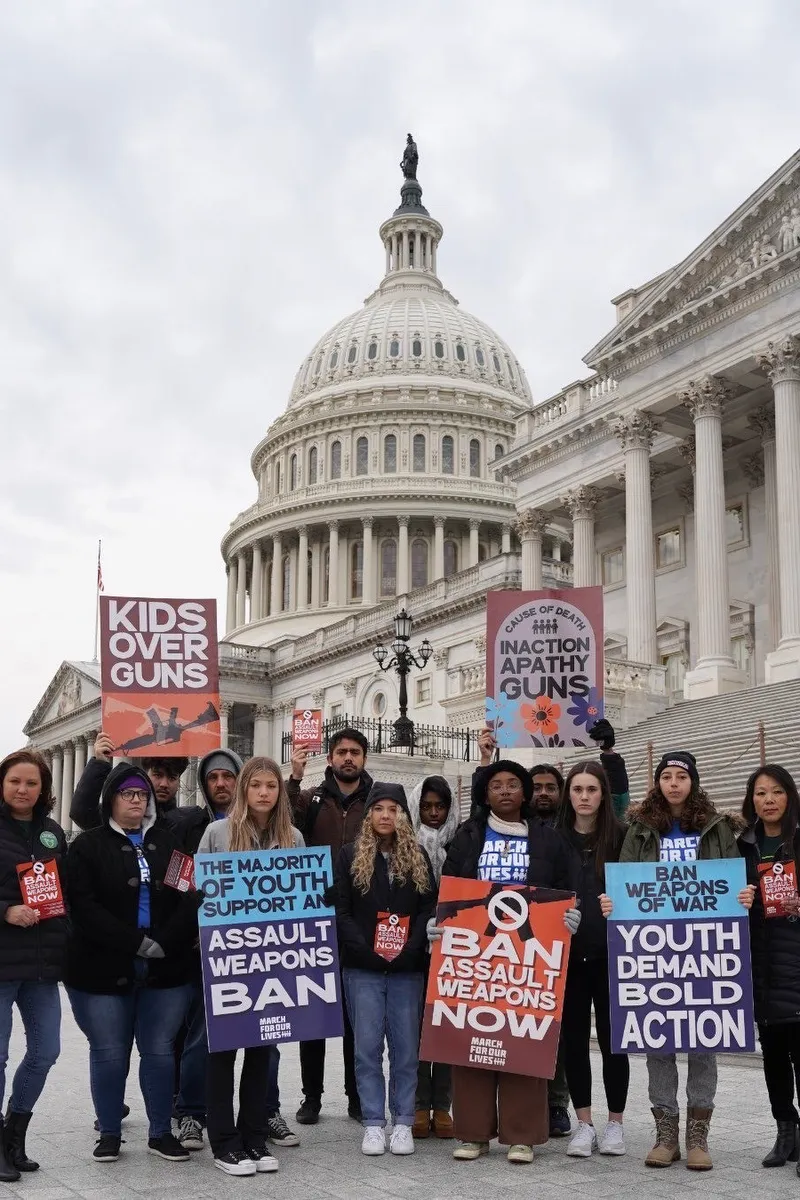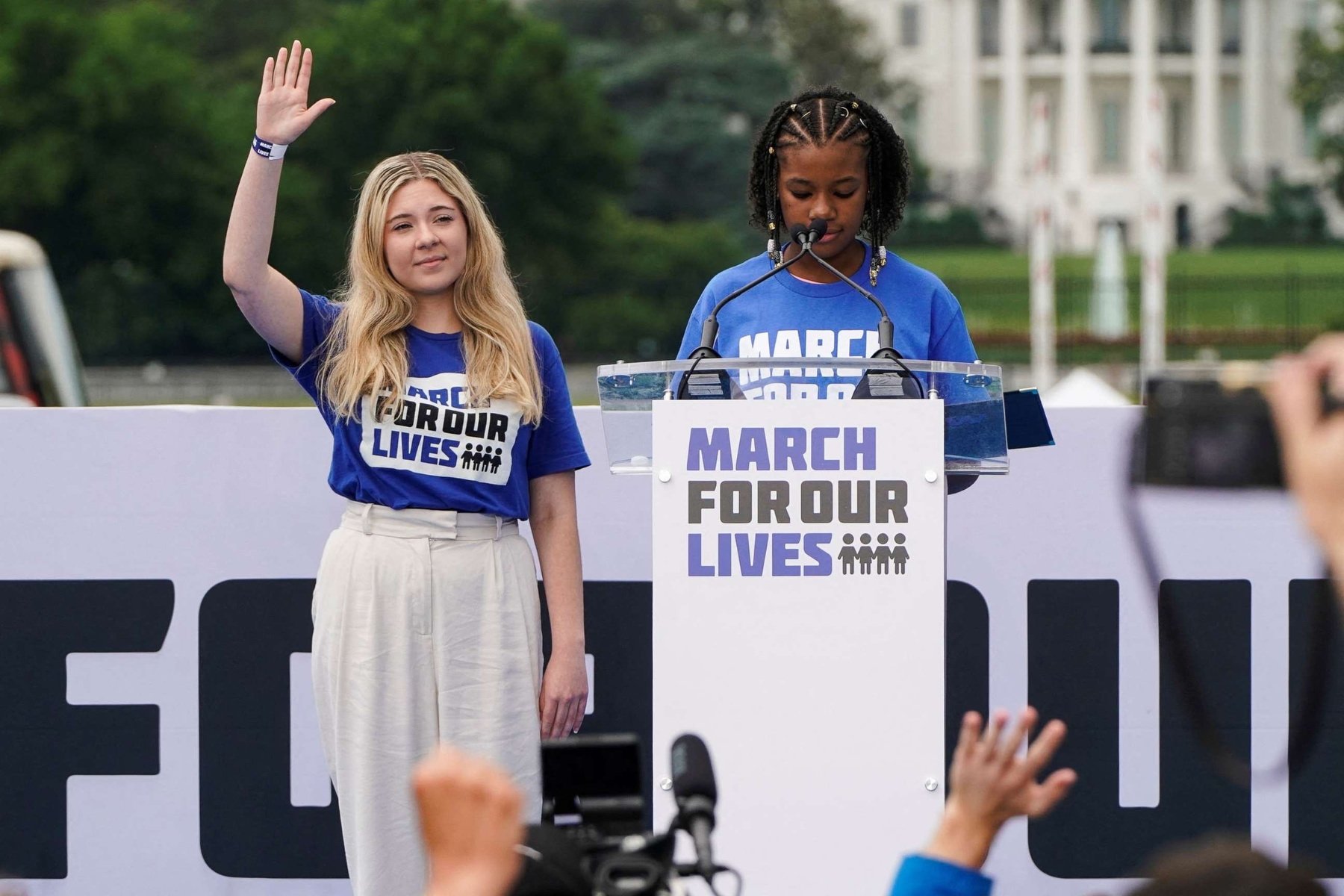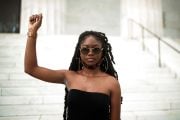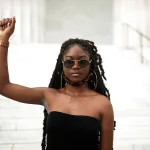March for Our Lives, the youth-led gun violence prevention organization, announced Thursday that it is laying off 13 of 16 full-time staffers. The group is naming as its new executive director Jaclyn Corin, 24, one of the organization’s original co-founders and a Parkland survivor.
“We are facing financial challenges as an organization, not unlike many nonprofit advocacy organizations in this time,” Corin said in an exclusive interview with The 19th. “I am sure things would look differently with a different outcome of the election, but these are the systems and circumstances in which we have to make adjustments based on the financial situation we find ourselves in. It is incredibly unfortunate that these cuts have to happen.”
Democratic donors have significantly pulled back funding for both Democratic candidates and progressive organizations in the wake of Republican Donald Trump’s triumph in the 2024 presidential election. According to tax filings, in 2023, the group spent $1.75 million, more than the $1.42 million it brought in that year, almost all from donations. March for Our Lives declined to share financial information for the 2024 fiscal year.
Corin said that since its founding in 2018 following the mass shooting at Marjory Stoneman Douglas High School in Parkland, Florida, March for Our Lives has grown in its scope.
“While these efforts were important, we ultimately took on more than our resources could sustain over the long term — and we take responsibility for that,” Corin said. “Now, we are making an intentional effort to double down where we are most effective: mobilizing young people to hold their leaders accountable for failing to address the number one killer of kids.”
-
Read Next:
Corin said March for Our Lives is primed to return to the sense of “urgency” felt when its founders first created the group on the floor of one member’s living room floor.
“We started as a megaphone for the movement, as a tool for young people to be able to channel their anger and fear of experiencing gun violence in their schools, on their streets, at movie theaters, where they go. It was really an accountability tool to call out gun manufacturers, the broader gun lobby, politicians — to tell them that we call BS on the way that our systems currently operate,” she said, referencing a speech given by Parkland survivor X Gonzalez in Fort Lauderdale just days after the mass shooting that took the lives of 17 students and staff at their high school.
Corin said that in her new role, she is thinking about the “striking” political differences between young men and young women.

“I think young women are our base in so many ways, and that’s why I think it’s uniquely important and symbolic that I am a young woman in this leadership role,” she said. “Young women have always been such a key part of social movements, the backbone of social movements.”
Young men in America have grown increasingly conservative, especially compared with young women, but Corin sees gun violence as an issue that doesn’t fall neatly into partisan politics and said that to be successful, the group will also have to reach young men in addition to young women.
“We’ll do that by using the message that this is a true, defining issue of our generation because no matter someone’s gender, everyone is impacted by gun violence,” she said. “That’s why I’m so excited about our new direction as an organization and look forward to putting it into practice. It’s really about centering the common experience of gun violence in this generation, as opposed to making it a gender divide.”
Po Murray, the co-founder and chairwoman of the Newtown Action Alliance, met Corin following the Parkland shooting just as March for Our Lives was being founded and sees the group’s ability to speak to young people as key to the gun violence prevention movement.
“If I have to choose one organization of all the gun control groups to survive and receive the funding that is necessary, I would say invest in the young people and March for Our Lives,” Murray said.
Corin said it is critical that the group take a strong leadership role in giving young people practical tools to feel that they have influence over policy. “We look at our phone screens and see that there’s been another shooting, and we put it down and go on with our day like it’s normal,” Corin said. “It’s our role to basically snap people out of that trance again, make people recognize that this is not normal, call people out again in a very unapologetic way.”
Rob Wilcox said March for Our Lives played a key role in the formation of the White House Office of Gun Violence Prevention under the Biden administration. Wilcox served as co-deputy director of that office, which has since been disbanded by the Trump administration. This week, the Trump administration also removed the surgeon general’s warning declaring gun violence a public health crisis from the Department of Health and Human Services website, to comply with a Trump-issued executive order. Wilcox said the need for loud and targeted communication within the gun violence prevention movement is more critical now than ever.
“We’ve gone from governing for gun safety to governing for the gun industry, and my biggest concerns are the people that are going to be impacted by not deploying an all-of-government approach to this public health crisis,” he said.
-
Read Next:
Having a survivor, like Corin, lead the organization is “so important,” Wilcox said. Survivors are intimately aware of the fact the past 10 years have been “the most successful 10 years for gun violence prevention ever,” he explained, with the first federal gun violence prevention law in 30 years creating $15 billion in federal funding for this work. He pointed to declines in homicides in 2023 and 2024 and said, “We have the playbook and we’ve been able to execute it because of all the incredible organizations in the gun violence prevention movement, including March for Our Lives. And so our job isn’t to run away from our solutions, but to double down on those.”
Murray said Corin is the right person to lead March for Our Lives today. “When I met Jackie, she was young. She was a baby. But now she’s grown into a very smart, intelligent woman and I know that because she cares so deeply about this issue, she’s going to put her heart and soul into it.” Murray sees a need for someone to create messaging that will reach young people and said Corin is poised to deliver that.
-
Read Next:
Corin said effective digital mobilization to reach young people is more important than ever, and that under her leadership the organization will be focused on “being extremely creative in doing that.” Corin noted that in addition to innovative social media and digital engagement strategies, the group will also be reengaging with public creative and art-based engagement projects intended to spark larger cultural conversation.
After graduating from high school, Corin went to Harvard University, where she majored in government and minored in education, and then received her master’s degree in public policy from Oxford University as a Michael von Clemm Scholar.
In the days after the shooting at her high school, Corin was instrumental in mobilizing 100 Parkland students to go to the Florida legislature to push lawmakers to raise the minimum age to buy a firearm from 18 to 21 in the state. She was 17 years old and March for Our Lives’ first director of outreach.
“I was one of those young people who didn’t know how to do lobbying, who didn’t know that I had power to actually make these conversations happen,” she said. Reaching other young people, especially those under the age of 25, is key to March for Our Lives’ new focus, she said. “We hope to remind people of the insanity of the existence of this issue in this country and then give them the tools for how to actually make a change in their communities.”
Correction: An earlier version of this article incorrectly stated what happened to former executive director Natalie Fall. She resigned last month.








